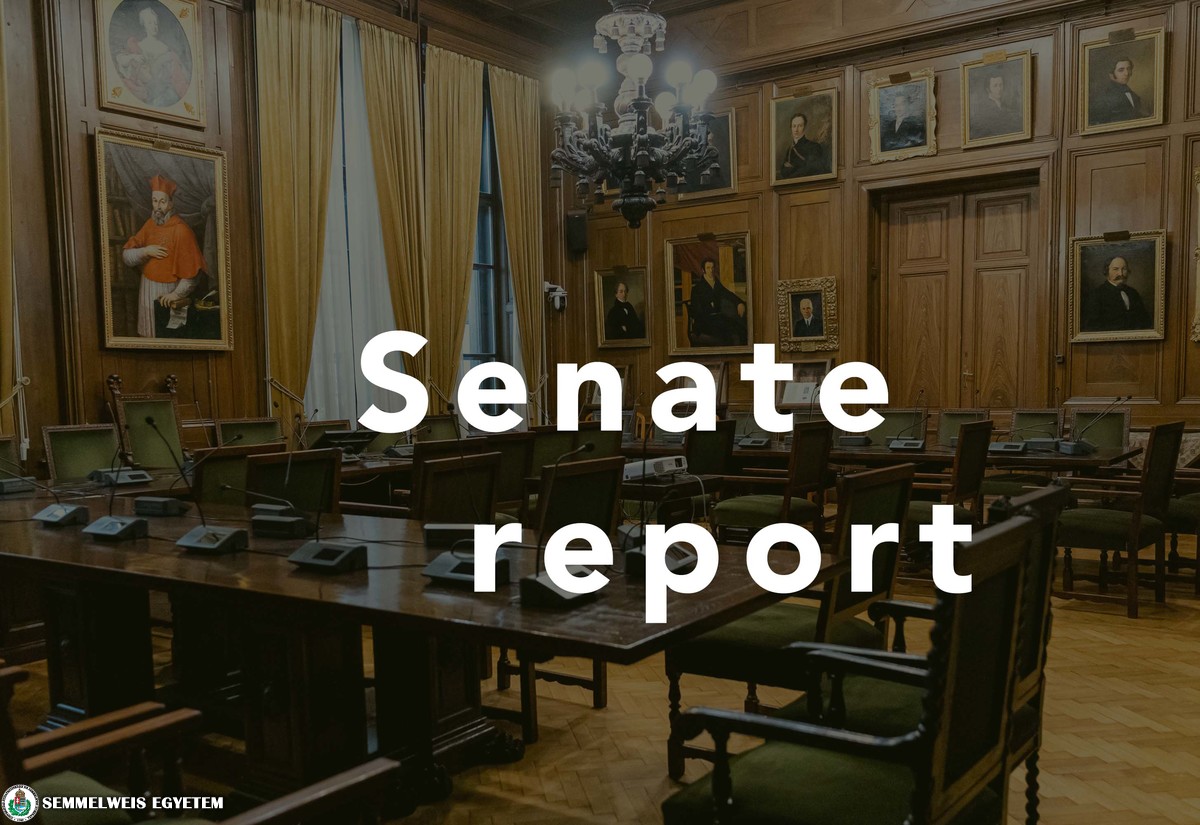The Senate adopted the work plan for the first half of the year at its February meeting. Among the curricular reform proposals, the submissions of the Faculty of Pharmaceutical Sciences (GYTK) and the Faculty of Health and Public Administration (EKK) will be discussed in April, the proposal of the András Pető Faculty (PAK) will be reviewed in May, while the proposals of the Faculty of Medicine (ÁOK), the Faculty of Health Sciences (ETK) and the Faculty of Dentistry (FOK) will be considered in June.
The Board agreed to fund the European Journal of Mental Health.
The senators discussed and adopted a proposal on decisions related to the integration of certain national institutes. As of March 1, the neurology and neurosurgery outpatient and inpatient services at the Amerikai Road site of the Institute of Mental Health, Neurology and Neurosurgery and the general surgery, orthopedics, and rehabilitation services at the Szanatórium Street site of the National Institute of Musculoskeletal Health (OMINT) will continue to operate as an integral part of the university. The Amerikai Road site’s neurology and neurosurgery outpatient and inpatient services, as well as the Rehabilitation Institute’s general surgery, orthopedic, and rehabilitation services are provided by the University Clinical Centre as legal successor. With the integration, the Neurosurgery and Neurointerventional Clinic was created on the Amerikai Rd and the Rehabilitation Clinic in Budakeszi as of March 1. With the integration, the Clinical Center’s rules of procedure will be modified and the number of its organizational units will increase from 40 to 42.
New organizational units will be established to perform the technical, economic, operational and IT tasks of the two new clinics. Pursuant to the Organizational and Operational Rules, the two new block directorates are the Medical Rehabilitation Block Directorate and the Amerikai Road Clinical Block Directorate. The new block directorates will operate as autonomous departments with autonomous budgetary powers, with the objective of performing the integrated management and concentrated economic-technical tasks of the two new clinics. Concurrently with the establishment of the new departments, two new directorates will be created within the Directorate General of Information Technology to ensure the efficient management of the entire IT infrastructure of the sites, the full local provision of IT services and the on-site development of central IT services. The new departments are the Amerikai Road Unit IT Directorate and the Medical Rehabilitation Unit IT Directorate.
A total of 1 028 people will be employed in the new departments and 48 people will be redeployed from the merging institutions to the central organizational units.
With the integration, the university’s budget adopted in December 2023 will be modified, while the balance will remain intact. The two merging institutions will bring HUF16.5 billion of additional revenue to the university’s budget thanks to their own performance, salary subsidies and other appropriated subsidies. In order to cover the planned expenditure, a consolidation difference of around HUF 2.4 billion will be added, increasing the total university budget of HUF 245 billion to around HUF 264 billion in 2024. The total expenditure of around HUF 252 billion will also increase by HUF 18 billion to HUF 270 billion.
The Senate voted to amend certain provisions of the Organizational and Operational Rules. These amendments are partly of technical nature and include changes to the names and scope of business associations. Another set of amendments concerns the exercise of certain powers relating to the dual training of vocational training institutions. Under the amendment to the Regulation on Fees and Allowances, the amount of the scientific scholarship of the Faculty of General Medicine is increased from HUF 50 000 to HUF 250 000 per person. This concerns the scholarship for 12 students per year.
The Board voted to launch the CBT (cognitive behavioral therapy) consultant and CBT therapist training courses. The new specialized training courses aim to bridge the gaps in psychology and psychotherapy education and to make targeted, evidence-based cognitive behavioral therapy, which is widely available abroad, accessible to the domestic population with psychological difficulties and mental disorders.
Senators voted to change the name of the Department of Public Health. Reflecting the evolution of the profession and the subject, and in line with the strategic objectives set by the university’s management, the new name of the Institute is the Department of Preventive Medicine and Public Health. One of the main reasons for the renaming is the institute’s contribution to the ‘Caring University Model Program’, in the framework of which the first preventive medicine outpatient clinic in the country was established.
The Senators approved the annual reports of the standing committees with university competence established by the Senate and approved the doctoral delegates to the committees.
The senators decided on lecturer appointments and also reviewed current applications for senior and lecturer-researcher positions.
Anita Szepesi
Translation: Judit Szabados-Dőtsch
Photo: Attila Kovács – Semmelweis University



